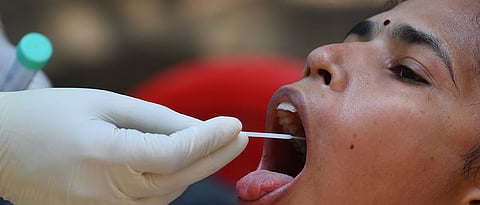

Pune: Around 65 per cent of patients of coronavirus in Maharashtra are asymptomatic as they do not show the physical symptoms associated with the virus-like fever, cough and shortness of breath, as per a report published this week by the State health government.
Doctors feel that it is important to ensure a strict measure to keep these asymptomatic patients in check so that high-risk patients are not at risk.
Medical experts Amol Naikawadi, Dr Mubasheer Ali and Dr Mahesh Lakhe spoke to Sakal Times about this issue.
Speaking to Sakal Times, Dr MD Mubasheer Ali, Consultant Internal Medicine at Apollo TeleHealth said that there is a piece of evidence that SARS-CoV-2(COVID-19) can spread from asymptomatic individuals to all the contacts and such individuals are called carriers or silent spreaders.
"Asymptomatic carriers during the incubation period can be a latent infection source of COVID-19. In the present scenario of lockdown in India, we need to understand that asymptomatic cases of COVID-19 among the normal population fuel a growing concern.
"These asymptomatic patients are infected and yet feel generally fine without a single symptom and go about their daily lives, giving the virus to friends, family members, and strangers without knowing that they themselves have it," said Dr Ali.
He also said that though, laboratory-confirmed symptomatic patients are the primary sources of infection. At the same time, asymptomatic carriers can also be a source to propagate the outbreak.
"These patients are not easy to detect when initially infected but might have abnormal symptoms later. There is not a single reliable study to determine the number of asymptomatic. It is likely we will only learn the true extent once population-based antibody testing is undertaken extensively. So if lockdown is relaxed or lifted all such asymptomatic carriers will be out doing their daily chores and will have the tendency to spread the disease to a wider population unknowingly, whereas lockdown is at least limiting the spread to the family and contacts only," explained Dr Ali.
Dr Mahesh Lakhe, from the Infectious Disease department at Columbia Asia Hospital, shared more inputs. He said that some measures could be taken up to prevent the spread of infection from asymptomatic nCov2 carriers to a vulnerable population.
"Firstly, we should test robustly with rapid testing methods and isolating the patients from an elderly and vulnerable population. 'Reverse quarantine' those vulnerable individuals in their houses.
"Isolation and social distancing in 'Hotspot'/'Red-zone' areas even after lifting the lockdown is a must. We should control hypertension, diabetes and other chronic diseases with diet and medicines in consultation with your doctor on video or telephonic consultation rather than visiting crowded clinics unless a dire necessity," said Dr Lakhe.
He added that vaccinating the vulnerable population should be done as soon as possible when vaccines are available.
"Wear mask all the time and maintain hand hygiene even when at home. Special care should be taken if you have any elderly person at home or if you are going out for your home for work even after the lockdown is lifted," Dr Lakhe advised.
Amol Naikawadi, Joint Managing Director (JMD) at Indus Health Plus said that the significance of prevention, early detection, extensive testing strategy and strict social distancing practice is the best possible way to control the transmission of COVID - 19.
"It is imperative to reach out as many people as possible, especially in hot zones and create awareness and also build confidence so that more people come forward. Our detection rates are around 4 to 5 per cent, which is better than a lot of countries. For asymptomatic people specifically in hotpots Rapid Antibody test is a good screening method," said Naikawadi.
